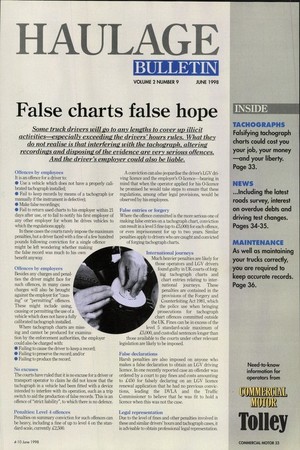HAULAGE BULLETIN False charts false hope Some truck drivers will
Page 35

If you've noticed an error in this article please click here to report it so we can fix it.
go to any lengths to cover up illicit activities—especially exceeding the drivers' hours rules. What they do not realise is that interfering with the tachograph, altering recordings and disposing of the evidence are very serious offences. And the driver's employer could also be liable.
Offences by employees It is an offence for a driver to: • Use a vehicle which does not have a properly calibrated tachograph installed; • Fail to keep records by means of a tachograph (or manually if the instrument is defective); • Make false recordings; • Fail to return used charts to his employer within 21 days after use, or to fail to notify his first employer of any other employer for whom he drives vehicles to which the regulations apply.
Offences by employers Besides any charges and penalties the driver might face for such offences, in many cases charges will also be brought against the employer for "causing" or "permitting" offences. These might include using, causing or permitting the use of a vehicle which does not have a fully calibrated tachograph installed.
Where tachograph charts are missing and cannot be produced for examination by the enforcement authorities, the employer could also be charged with: • Failing to cause the driver to keep a record; • Failing to preserve the record; and/or • Failing to produce the record.
No excuses The courts have ruled that it is no excuse for a driver or transport operator to claim he did not know that the tachograph in a vehicle had been fitted with a device intended to interfere with its operation, such as a trip switch to aid the production of false records. This is an offence of "strict liability", to which there is no defence.
Penalties: Level 4 offences Penalties on summary conviction for such offences can be heavy, including a fine of up to level 4 on the standard scale, currently £2,500. A conviction canals° jeopardise the driver's LGV dri ving licence and the employer's 0-licence bearing in mind that when the operator applied for his 0-licence he promised he would take steps to ensure that these regulations, among other legal provisions, would be observed by his employees.
False entries or forgery Where the offence committed is the more serious one of making false entries on a tachograph chart, conviction can result in a level 5 fine (up to £5,000) for each offence, or even imprisonment for up to two years. Similar penalties apply to drivers who are caught and convicted of forging tachograph charts.
International journeys those available to the courts under other relevant legislation are likely to be imposed.
False declarations Harsh penalties are also imposed on anyone who makes a false declaration to obtain an LGV driving licence. In one recently reported case an offender was ordered by a court to pay fines and costs amounting to £450 for falsely declaring on an LGV licence renewal application that he had no previous convictions, leading the DVLA and the Traffic Commissioner to believe that he was fit to hold a licence when this was not the case.
Legal representation Due to the level of fines and other penalties involved in these and similar drivers' hours and tachograph cases, it is advisable to obtain professional legal representation.




















































































































